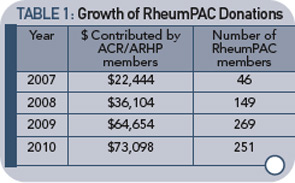I attended a small (four people) breakfast for Rep. Fred Upton. “Fred,” as he requested I call him, is a moderate Republican who honestly listens to his constituents. He was the lead Republican on the Arthritis Prevention Control and Cure Act. I attended this event and was able to remind Rep. Upton about the issues in healthcare reform that are directly affecting rheumatologists. These include a pediatric subspecialty loan repayment program—much like the provision in the Arthritis Act specifically addressing pediatric rheumatologists—to ease the financial burden for medical students interested in pediatric subspecialties. Additionally, I had the opportunity to further educate him on extreme cuts in DXA reimbursements. He verbally stated that he is supportive of both provisions. I encouraged him to talk to his Republican colleagues on the committee about the importance of these issues. As the Energy and Commerce Committee continues to work on the legislation, this was a great opportunity to have an hour of the congressman’s ear.
Attending the breakfast was beneficial to building a relationship with Rep. Upton and provided an opportunity to further educate him on rheumatology issues. The ACR continues to cultivate its relationship with the congressman. With the recent leadership change in the House, Rep. Upton is now the chairman of the House Energy and Commerce Committee, which has jurisdiction over many healthcare issues. As you can see, RheumPAC provides opportunities to develop relationships with Congress that will benefit the ACR.
How Does RheumPAC Decide Who Receives Contributions?
RheumPAC develops a slate of key congressional members who are prioritized based on demonstrated support of rheumatology-related issues through sponsorship, co-sponsorship, and letter writing as well as leadership positions. RheumPAC discusses and votes on contributions to each member of Congress and determines an event to personally deliver the contribution—an opportunity to discuss rheumatology issues. In 2010, 91% of RheumPAC-supported candidates were elected (or re-elected) to the 112th Congress.
I received this email from an ACR member who attended an event for Senate Finance Committee member Charles Schumer (D-NY).
I attended a fundraiser for Sen. Schumer. He spoke for 30 minutes and took questions. I asked a question and got in SGR and loan repayment. He remembered and addressed me by name and promised to have his senior staffer sit down with us. Lots of face time, at least 90 minutes, and I think it was productive. He is very supportive of our issues.
Again, access is the name of the game. RheumPAC provides the ACR opportunities to speak face to face with lawmakers who are developing policies affecting our profession and our patients. I have attended several of these events myself and have seen how valuable they are in advancing congressional knowledge of rheumatology. Does this solve all of our issues? Quite simply, no. RheumPAC is only one method to educate Congress on the value of rheumatology. The ACR continues to educate members on the importance of advocacy and brings members to Capitol Hill each September for Advocates for Arthritis. Additionally, the ACR is rolling out a major public relations campaign targeting Congress, President Obama’s administration, and other “key influencers” (I will be discussing that campaign in next month’s column).

